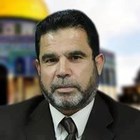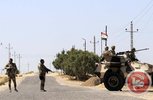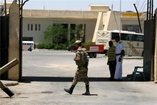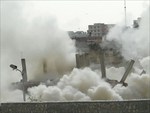31 jan 2015

Islamic Resistance Movement, Hamas, rejected the Cairo Court of Urgent Matters ruling to ban the Ezzeddin al-Qassam Brigades, the armed wing of Hamas, designating it a terrorist organization.
Hamas spokesman in Gaza Dr. Sami Abu Zuhri said, in a statement on Saturday, the Egyptian court’s decision is politicized and serves the Israeli occupation.
Hamas rejected the accusation of Ezzeddin al-Qassam Brigades of the intervention in the Egyptian internal affair. “Ezzeddin al-Qassam Brigades are fighting against the Israeli occupation and constitute a modal for the dignity of the nation”, Abu Zuhri said.
For his part, Hamas spokesman abroad Husam Badran said, in a statement issued in Doha, that the Egyptian ruling is shameful and offensive to Egypt.
He stressed that banning Hamas and designating it as a terrorist group offers a free service to the Israeli occupation. The armed wing is not only defending Palestine but also the entire Islamic nation”, he added.
The Cairo Court of Urgent Matters ruled on Saturday to designate the Ezzedine Al-Qassam Brigades, the armed wing of Hamas, as a terrorist organization. The court claimed that the Ezzedine Al-Qassam Brigades were involved in the recent terror attacks against security forces in Egypt, particularly in Sinai.
Hamas spokesman in Gaza Dr. Sami Abu Zuhri said, in a statement on Saturday, the Egyptian court’s decision is politicized and serves the Israeli occupation.
Hamas rejected the accusation of Ezzeddin al-Qassam Brigades of the intervention in the Egyptian internal affair. “Ezzeddin al-Qassam Brigades are fighting against the Israeli occupation and constitute a modal for the dignity of the nation”, Abu Zuhri said.
For his part, Hamas spokesman abroad Husam Badran said, in a statement issued in Doha, that the Egyptian ruling is shameful and offensive to Egypt.
He stressed that banning Hamas and designating it as a terrorist group offers a free service to the Israeli occupation. The armed wing is not only defending Palestine but also the entire Islamic nation”, he added.
The Cairo Court of Urgent Matters ruled on Saturday to designate the Ezzedine Al-Qassam Brigades, the armed wing of Hamas, as a terrorist organization. The court claimed that the Ezzedine Al-Qassam Brigades were involved in the recent terror attacks against security forces in Egypt, particularly in Sinai.

Senior Hamas official Salah al-Bardawil strongly denounced the Egyptian media for accusing his Movement and its armed wing, al-Qassam Brigades, of being behind the recent Sinai bombings.
"The cycle of violence taking place in Egypt is something sad and disturbing," Bardawil stated on his Facebook page on Friday.
"But what gets you angry is to see some corrupt Egyptian media hasten faster than missiles to make accusations against Hamas and al-Qassam Brigades."
He added that those people make their accusations against the Movement either out of ignorance, hatred or loyalty to the Israeli occupation.
"The cycle of violence taking place in Egypt is something sad and disturbing," Bardawil stated on his Facebook page on Friday.
"But what gets you angry is to see some corrupt Egyptian media hasten faster than missiles to make accusations against Hamas and al-Qassam Brigades."
He added that those people make their accusations against the Movement either out of ignorance, hatred or loyalty to the Israeli occupation.
30 jan 2015

The Palestinian security apparatuses imposed a series of tight security measures along the Gaza-Egypt borders following Thursday’s deadly Sinai attack on Egyptian army officers.
Spokesman for the Gaza-based Palestinian interior ministry Eyad a-Bazm said in a press statement Friday the security apparatuses tightened security measures on the border with Egypt in the wake of the recent Sinai attack.
Dozens of Egyptian army officers were killed in a series of blasts that rocked Egyptian military sites in northern Sinai afternoon Thursday. Militant group Ansar Beit Al-Maqdis claimed responsibility for the attack.
Spokesman for the Gaza-based Palestinian interior ministry Eyad a-Bazm said in a press statement Friday the security apparatuses tightened security measures on the border with Egypt in the wake of the recent Sinai attack.
Dozens of Egyptian army officers were killed in a series of blasts that rocked Egyptian military sites in northern Sinai afternoon Thursday. Militant group Ansar Beit Al-Maqdis claimed responsibility for the attack.
26 jan 2015

Egypt on Sunday extended by three months a state of emergency in force since late October in areas of North Sinai after an attack that killed 30 soldiers.
The authorities are battling a dogged insurgency in North Sinai, where militants have carried out regular attacks on security forces since the army ousted former president Mohamed Morsi in July 2013.
On October 24, a suicide bomber and gunmen killed 30 soldiers near the provincial capital of El-Arish.
The cabinet decided to extend the emergency by three months, including a night-time curfew between 7:00 p.m. and 6:00 a.m.
The military is building a buffer zone along the border with Gaza to prevent militants infiltrating from the Palestinian enclave.
The entire city of Rafah is set to be evacuated to create the buffer zone, and under President Sisi nearly 1,600 tunnels have been destroyed.
In late October Egypt also closed the Rafah border crossing, Gaza's only gateway to the world not controlled by Israel.
The authorities are battling a dogged insurgency in North Sinai, where militants have carried out regular attacks on security forces since the army ousted former president Mohamed Morsi in July 2013.
On October 24, a suicide bomber and gunmen killed 30 soldiers near the provincial capital of El-Arish.
The cabinet decided to extend the emergency by three months, including a night-time curfew between 7:00 p.m. and 6:00 a.m.
The military is building a buffer zone along the border with Gaza to prevent militants infiltrating from the Palestinian enclave.
The entire city of Rafah is set to be evacuated to create the buffer zone, and under President Sisi nearly 1,600 tunnels have been destroyed.
In late October Egypt also closed the Rafah border crossing, Gaza's only gateway to the world not controlled by Israel.
25 jan 2015

Rafah
crossing has been sealed for a total of 241 days during 2014, and
opened for only 125, the Border and Crossing Authority reported Sunday.
According to Al Ray Palestinian Media Agency, the Interior Ministry's crossing authority has issued its annual statics reports regarding passenger traffic via Rafah crossing, noting that the crossing was closed for 66% of 2014.
It explained that, out of the 125 days in which the crossing was opened, 51 days were in correlation with the transport of causalities during the latest Israeli military aggression on the region.
Other days were allocated for the travel of pilgrims.
Rafah crossing has been closed since mid 2013, except for three days every two to three months. Most Palestinian travellers were not allowed access because of subsequent restrictive measures imposed by Egyptian authorities.
The statics showed that the total number of passengers who traveled in and out of the Gaza Strip, during the past year, amounted to some 101,442 passengers, with 52,431 leaving and 49,011 entering.
Egyptian authorities banned a total of 4,668 Palestinians from travel.
These statistics reflect a significant decrease in the number of passengers travelling in and out Gaza via Rafah, with the number of travelers in 2013 amounting to three times the count of 2014.
Rafah crossing, which is the only outlet for Palestinians in the besieged Gaza Strip, does not operate to its full capacity, with the most common problem facing Palestinian travelers being that of a network of corruption on the Egyptian side.
The latest statistics revealed by the Department of Registration Authorities shows that the number of registered Palestinians in urgent need of travel amounts to more than 30,000 cases.
Palestinians now make up the largest refugee group in the entire world, according to UN statistics.
According to Al Ray Palestinian Media Agency, the Interior Ministry's crossing authority has issued its annual statics reports regarding passenger traffic via Rafah crossing, noting that the crossing was closed for 66% of 2014.
It explained that, out of the 125 days in which the crossing was opened, 51 days were in correlation with the transport of causalities during the latest Israeli military aggression on the region.
Other days were allocated for the travel of pilgrims.
Rafah crossing has been closed since mid 2013, except for three days every two to three months. Most Palestinian travellers were not allowed access because of subsequent restrictive measures imposed by Egyptian authorities.
The statics showed that the total number of passengers who traveled in and out of the Gaza Strip, during the past year, amounted to some 101,442 passengers, with 52,431 leaving and 49,011 entering.
Egyptian authorities banned a total of 4,668 Palestinians from travel.
These statistics reflect a significant decrease in the number of passengers travelling in and out Gaza via Rafah, with the number of travelers in 2013 amounting to three times the count of 2014.
Rafah crossing, which is the only outlet for Palestinians in the besieged Gaza Strip, does not operate to its full capacity, with the most common problem facing Palestinian travelers being that of a network of corruption on the Egyptian side.
The latest statistics revealed by the Department of Registration Authorities shows that the number of registered Palestinians in urgent need of travel amounts to more than 30,000 cases.
Palestinians now make up the largest refugee group in the entire world, according to UN statistics.
23 jan 2015

The Egyptian navy arrested a Gazan fisherman and wounded another during a gunfire attack, claiming they entered the territorial waters.
Eyewitnesses said that Egyptian naval soldiers opened fire at a Palestinian fishing boat inside the Palestinian waters near the border with Egypt.
For its part, the Egyptian army claimed its naval forces opened fire at two fishermen aboard a boat after it was spotted within its territorial waters.
One of the two fishermen suffered a bullet injury in his abdomen, while the other was taken in for interrogation. The fishing boat was also confiscated, army added.
The wounded Palestinian was transferred to a nearby military hospital in El-Arish.
Eyewitnesses said that Egyptian naval soldiers opened fire at a Palestinian fishing boat inside the Palestinian waters near the border with Egypt.
For its part, the Egyptian army claimed its naval forces opened fire at two fishermen aboard a boat after it was spotted within its territorial waters.
One of the two fishermen suffered a bullet injury in his abdomen, while the other was taken in for interrogation. The fishing boat was also confiscated, army added.
The wounded Palestinian was transferred to a nearby military hospital in El-Arish.
22 jan 2015

Egyptian authorities on Wednesday evening released 45 Palestinians from the Gaza Strip who had been in custody for several months after they crossed into Egypt without documents hoping to travel by sea to Europe.
Sources in the Interior Ministry of the former Hamas-run government told a Ma'an reporter in Gaza City that the freed detainees were transferred to the Gaza Strip Wednesday after spending several months in Egyptian prisons.
The majority of the detainees were arrested after they crossed into Egypt without documents but were unable to leave for Europe by sea.
About three weeks ago, another group of Gazan detainees were freed from Egyptian custody under similar circumstances.
Thousands of Gazans are thought to have escaped via tunnels to Egypt in order to flee the nearly two-month Israeli offensive that left more than 2,000 dead and 110,000 homeless in the tiny coastal enclave.
Egyptian authorities have in recent months promised to crack down on the flow and have arrested record numbers of Palestinians fleeing Gaza.
But the devastation wreaked by the Israeli bombardment and the continued siege have dimmed Gaza's economic prospects for the near future, and even as Egypt continues to crack down on movement of goods and people through tunnels, the tide is likely to continue.
2014 saw a surge in the numbers of migrants attempting to make the hazardous crossing from across North Africa and the Middle East to Europe.
The UN's refugee agency UNHCR said in mid-December that 384,000 people had tried the crossing since the beginning of the year, of whom more than 4,000 died while attempting the journey.
The surge is the result of political instability and a lack of economic prospects across the southern Mediterranean and Africa, and the number includes many Palestinians who have fled Syria as well as Gaza via boat from Egypt.
Sources in the Interior Ministry of the former Hamas-run government told a Ma'an reporter in Gaza City that the freed detainees were transferred to the Gaza Strip Wednesday after spending several months in Egyptian prisons.
The majority of the detainees were arrested after they crossed into Egypt without documents but were unable to leave for Europe by sea.
About three weeks ago, another group of Gazan detainees were freed from Egyptian custody under similar circumstances.
Thousands of Gazans are thought to have escaped via tunnels to Egypt in order to flee the nearly two-month Israeli offensive that left more than 2,000 dead and 110,000 homeless in the tiny coastal enclave.
Egyptian authorities have in recent months promised to crack down on the flow and have arrested record numbers of Palestinians fleeing Gaza.
But the devastation wreaked by the Israeli bombardment and the continued siege have dimmed Gaza's economic prospects for the near future, and even as Egypt continues to crack down on movement of goods and people through tunnels, the tide is likely to continue.
2014 saw a surge in the numbers of migrants attempting to make the hazardous crossing from across North Africa and the Middle East to Europe.
The UN's refugee agency UNHCR said in mid-December that 384,000 people had tried the crossing since the beginning of the year, of whom more than 4,000 died while attempting the journey.
The surge is the result of political instability and a lack of economic prospects across the southern Mediterranean and Africa, and the number includes many Palestinians who have fled Syria as well as Gaza via boat from Egypt.
17 jan 2015

Egyptian authorities arrested a Palestinian woman and her two sons as she arrived at the Cairo International Airport from Saudi Arabia on Saturday, Egyptian sources said.
The woman, identified only as W.F., was carrying 12 bags full of thousands of mobile phones, which the authorities considered contraband.
She and her two sons were taken in for interrogation and the bags were confiscated.
The woman, identified only as W.F., was carrying 12 bags full of thousands of mobile phones, which the authorities considered contraband.
She and her two sons were taken in for interrogation and the bags were confiscated.
14 jan 2015

President Mahmoud Abbas is scheduled to meet with Egyptian counterpart Abdel Fattah al-Sisi in Cairo on Wednesday, Egyptian officials said.
Abbas and the Egyptian president are likely to discuss the UN Security Council bid to end Israel's occupation and the reconstruction of the Gaza Strip.
A high-profile Palestinian delegation will join Abbas, including PLO negotiator Saeb Erekat, presidential spokesman Nabil Abu Rudeina, ambassador to Egypt Jamal Shubaki, and head of the PA's general intelligence service Majid Faraj.
Abbas and the Egyptian president are likely to discuss the UN Security Council bid to end Israel's occupation and the reconstruction of the Gaza Strip.
A high-profile Palestinian delegation will join Abbas, including PLO negotiator Saeb Erekat, presidential spokesman Nabil Abu Rudeina, ambassador to Egypt Jamal Shubaki, and head of the PA's general intelligence service Majid Faraj.
12 jan 2015

The Egyptian authorities went back on promises to unblock the Rafah crossing on humanitarian grounds, just a couple of hours after they decided to open the passageway for three days as of Tuesday.
Head of Gaza’s border crossings authority said the Egyptian side broke its promises to open the crossing just two hours after it had notified us of their intents to unlock the route for three days—Tuesday, Wednesday, and Thursday allegedly due to the disappearance of a security officer from an Egyptian seaport.
Abu Sabha voiced deep disappointment over the annulment, warning of the serious repercussions of such a move on thousands of Gaza’s patients, humanitarian cases, students, and stranded wives.
He slammed the alleged abduction of the Egyptian officer, dubbing it an injudicious act that only sharpens the crisis rocking the besieged enclave.
Earlier, the Egyptian side notified the Gaza’s border crossings authority of their intents to open the Rafah crossing, blocked for several months, for three days starting Tuesday.
Meanwhile, a series of live snapshots broadcast by al-Jazeera TV revealed the damage wrought on the residents of the Egyptian Rafah border town due to the Egyptian army’s preparation to create a buffer zone along the Gaza borders.
The Egyptian army stepped up combing operations, using a drove of Apache helicopters, in search for the missing soldier.
The pictures document the launch of a series of demolition processes by the Egyptian military forces. The camera captured the army as flattening large swaths of Rafah and blowing up civilian homes and structures to widen the buffer zone.
Two Sinai citizens, obviously subjected to heavy gunfire shots, were proclaimed dead in the process.
Another four-year-old child died of freezing air inside one of the makeshift tents set up in the area after the Egyptian army blew up her family home in Rafah some few weeks ago.
Head of Gaza’s border crossings authority said the Egyptian side broke its promises to open the crossing just two hours after it had notified us of their intents to unlock the route for three days—Tuesday, Wednesday, and Thursday allegedly due to the disappearance of a security officer from an Egyptian seaport.
Abu Sabha voiced deep disappointment over the annulment, warning of the serious repercussions of such a move on thousands of Gaza’s patients, humanitarian cases, students, and stranded wives.
He slammed the alleged abduction of the Egyptian officer, dubbing it an injudicious act that only sharpens the crisis rocking the besieged enclave.
Earlier, the Egyptian side notified the Gaza’s border crossings authority of their intents to open the Rafah crossing, blocked for several months, for three days starting Tuesday.
Meanwhile, a series of live snapshots broadcast by al-Jazeera TV revealed the damage wrought on the residents of the Egyptian Rafah border town due to the Egyptian army’s preparation to create a buffer zone along the Gaza borders.
The Egyptian army stepped up combing operations, using a drove of Apache helicopters, in search for the missing soldier.
The pictures document the launch of a series of demolition processes by the Egyptian military forces. The camera captured the army as flattening large swaths of Rafah and blowing up civilian homes and structures to widen the buffer zone.
Two Sinai citizens, obviously subjected to heavy gunfire shots, were proclaimed dead in the process.
Another four-year-old child died of freezing air inside one of the makeshift tents set up in the area after the Egyptian army blew up her family home in Rafah some few weeks ago.
8 jan 2015

The Egyptian authorities intend to remove the whole city of Rafah in order to establish the buffer zone with the besieged Gaza Strip.
North Sinai governor Abdul-Fattah Harhour told a news conference on Wednesday that the Egyptian city of Rafah would be removed entirely, stressing that creating a buffer zone with Gaza requires that.
However, Harhour pledged that a new Rafah city would be built for the population away from the buffer zone.
Cairo claims its buffer zone is intended to fight terrorism in the Sinai and prevent cross border attacks on Israel.
The governor made his remarks on the eve of the second stage of the evacuation operation in Rafah.
1,220 homes inhabited by 2,044 families will be evacuated and demolished during this stage.
According to the governor, every family will be paid 1,500 Egyptian pounds, about 210 US dollars, in compensation to help them rent a temporary home until they are fully recompensed.
North Sinai governor Abdul-Fattah Harhour told a news conference on Wednesday that the Egyptian city of Rafah would be removed entirely, stressing that creating a buffer zone with Gaza requires that.
However, Harhour pledged that a new Rafah city would be built for the population away from the buffer zone.
Cairo claims its buffer zone is intended to fight terrorism in the Sinai and prevent cross border attacks on Israel.
The governor made his remarks on the eve of the second stage of the evacuation operation in Rafah.
1,220 homes inhabited by 2,044 families will be evacuated and demolished during this stage.
According to the governor, every family will be paid 1,500 Egyptian pounds, about 210 US dollars, in compensation to help them rent a temporary home until they are fully recompensed.
3 jan 2014

Zaki al-Hubi 17
A Palestinian boy was killed at the hands of Egyptian army soldiers on Friday night at the borders between Gaza Strip and the Sinai Peninsula.
Dr. Ashraf al-Qidra, the health ministry spokesman, said that 17-year-old Zaki al-Hubi was gunned down by Egyptian army soldiers to the east of Rafah, south of the Gaza Strip.
Local sources said that Hubi was hit with a bullet in his back and transferred to hospital where he was proclaimed dead.
The Palestinian interior ministry in Gaza strongly condemned the incident in a statement late Friday, asking the Egyptian authorities to open an investigation into the incident.
It said that the young men who tried to cross the border into Egypt were unarmed and posed no threat to the Egyptian security, describing the event as very serious. It said that the excessive use of force was unnecessary.
An Egyptian military spokesman said that border guards opened fire at four Palestinians while trying to cross into Egyptian territory.
He said that one of them fell wounded on the Palestinian side while three others surrendered to the Egyptian forces in the buffer zone.
He said that the four youngsters all 17 to 19 years of age said they were trying to buy cigarettes from Egypt then sell them in Gaza.
A Palestinian boy was killed at the hands of Egyptian army soldiers on Friday night at the borders between Gaza Strip and the Sinai Peninsula.
Dr. Ashraf al-Qidra, the health ministry spokesman, said that 17-year-old Zaki al-Hubi was gunned down by Egyptian army soldiers to the east of Rafah, south of the Gaza Strip.
Local sources said that Hubi was hit with a bullet in his back and transferred to hospital where he was proclaimed dead.
The Palestinian interior ministry in Gaza strongly condemned the incident in a statement late Friday, asking the Egyptian authorities to open an investigation into the incident.
It said that the young men who tried to cross the border into Egypt were unarmed and posed no threat to the Egyptian security, describing the event as very serious. It said that the excessive use of force was unnecessary.
An Egyptian military spokesman said that border guards opened fire at four Palestinians while trying to cross into Egyptian territory.
He said that one of them fell wounded on the Palestinian side while three others surrendered to the Egyptian forces in the buffer zone.
He said that the four youngsters all 17 to 19 years of age said they were trying to buy cigarettes from Egypt then sell them in Gaza.
Page: 2 - 1
